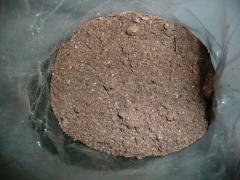Guano
| Infobox on Guano | |
|---|---|
| Example of Guano |  |
| Facts | |
| Origin | See text |
| Stowage factor (in m3/t) | 1,19/1,25 m3/t (bulk) |
| Humidity / moisture | Approx. 15% |
| Ventilation | - |
| Risk factors | See text |
Guano
Description
Guano is the excrement (feces and urine) of cave dwelling insectivorous bats, seabirds, and seals. The ideal type of guano is found in exceptionally dry climates, as rainwater drains the guano of nitrates. Guano is harvested on various islands in the Pacific Ocean (for example, the Chincha Islands) and in other oceans (for example, Juan de Nova Island and Christmas Island). These islands have been home to mass seabird colonies for many centuries, and the guano has collected to a depth of many meters.
br>
Application
In agriculture and gardening guano has a number of uses, including as: soil builder, lawn treatments, fungicide (when fed to plants through the leaves), nematicide (decomposing microbes help control nematodes), and as composting activator (nutrients and microbes speed up decomposition).
Shipment / Storage / Risk factors
Shipped in bulk or in bags. Guano has a high nitrogen content which is partly fixed in a compound insoluble in water and partly in the form of ammonia. The ammoniacal portion of guano is readily dissolved in water and evaporates constantly from the whole mass.
It is therefore necessary that bagged guano to be stowed in such a manner as to prevent it from coming into contact with moisture. The nitrate and salts content of this substance is affected by rain or fresh water but a chemical analysis will not be a reliable test due to the fact that water seeping into the caves from which the guano is obtained very often affects the commodity before it is shipped.
Guano contains about 15% moisture and is subject to loss in weight by drying out.
The handling of guano calls for special care as it throws off a fine powder which, together with the ammoniacal odour, affects the respiratory tract.
To be carefully protected from contact with salt water, but rain water does not adversely affect it.
Guano is a nitrogenous organic fertilizer with a high content of phosphoric acid and a moderate proportion of potash.











